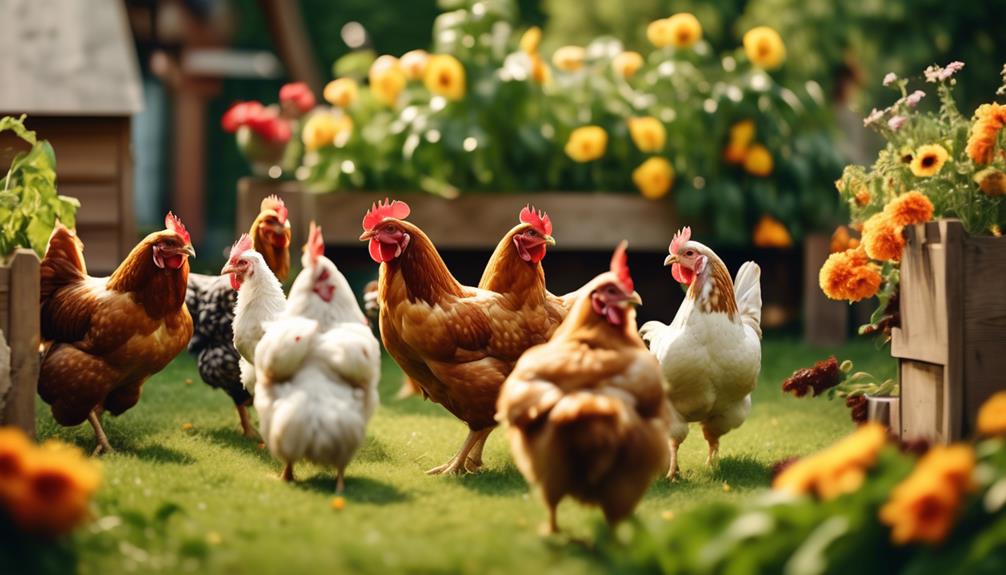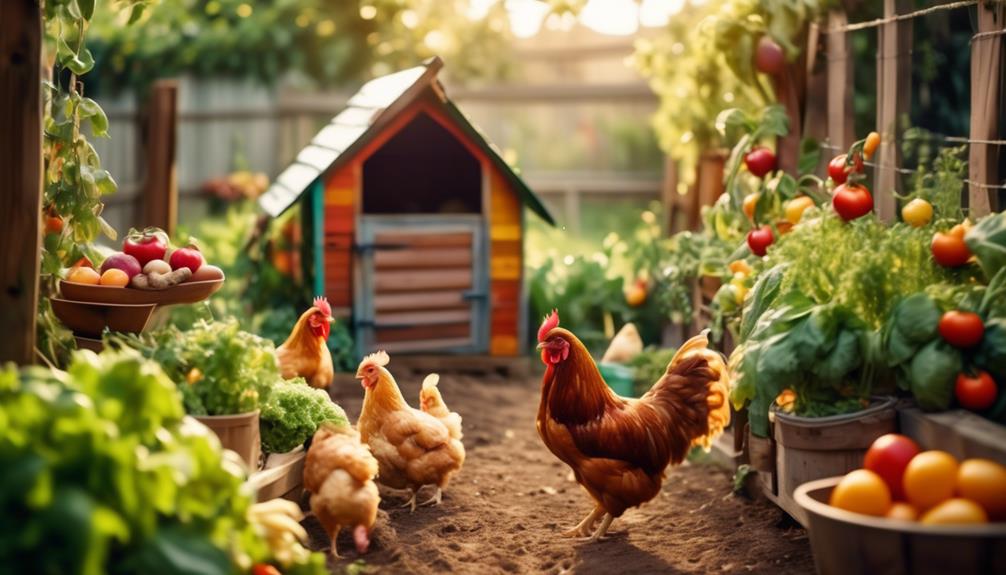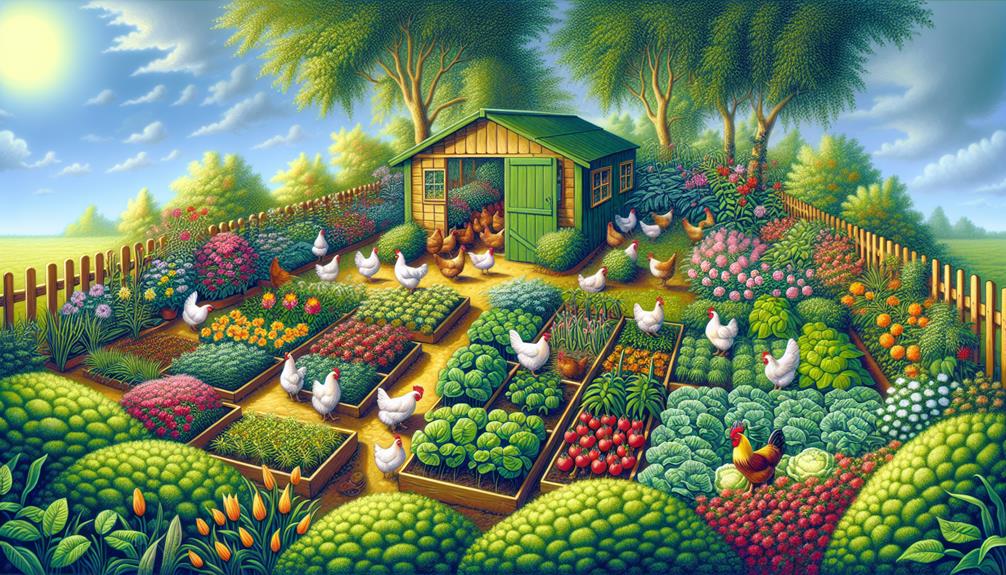In today's ever-evolving world, where individuals are seeking innovative ways to embrace self-sufficiency and sustainability, the concept of a thriving chicken coop garden combo has emerged as a popular solution.
By combining the benefits of a chicken coop and a garden, this integrated system offers a multitude of advantages.
From increased self-sufficiency and reduced expenses to improved soil fertility and enhanced pest control, the benefits are undeniable.
But how does one go about designing and maintaining such a system? What considerations should be made?
Join us as we uncover the intricacies of this innovative approach and unlock the full potential of a thriving chicken coop garden combo, as the rewards are plentiful and the possibilities endless.
Key Takeaways
- A chicken coop garden combo provides numerous benefits, including self-sufficiency, cost savings, improved soil fertility, enhanced pest control, and a sustainable lifestyle.
- Designing a successful chicken coop garden combo involves selecting a suitable location, constructing a secure coop and fenced garden area, incorporating raised beds or containers, and implementing a composting system.
- When selecting chicken breeds for the garden combo, it is important to consider their suitability for both egg production and meat, their docility and adaptability, and their foraging and pest control abilities.
- To maintain the chicken coop garden combo, it is essential to provide a balanced diet for chickens, regularly clean the coop, rotate crops in the garden, monitor and control pests and diseases, and ensure access to fresh water.
Benefits of Chicken Coop Garden Combo
Incorporating a chicken coop within a garden setting offers numerous advantages that maximize yields and promote sustainable practices.
Firstly, the integration of chickens and gardens increases self-sufficiency by providing a steady supply of fresh eggs and homegrown produce, thus reducing food expenses.
Additionally, the chicken manure acts as a natural fertilizer, enhancing soil fertility and promoting healthier plant growth.
Furthermore, chickens contribute to pest control by consuming insects and weeds present in the garden, reducing the need for chemical interventions.
The combination of chicken coop and garden also supports a sustainable lifestyle by reducing waste and carbon footprint.
Designing the Coop and Garden
When designing a chicken coop garden combo, it is essential to carefully consider the location, construction, and layout to ensure a successful and efficient integration of the coop and garden.
Raised bed construction is a popular choice for the garden as it provides numerous benefits. Raised beds offer improved drainage, reduced weed competition, and better soil quality. They also make it easier to manage pests and diseases.
To further enhance pest control methods, companion planting can be employed. Planting herbs such as basil, mint, and marigolds can help repel pests while attracting beneficial insects. Additionally, utilizing physical barriers such as wire mesh or row covers can protect plants from larger pests like chickens.
Selecting Suitable Chicken Breeds

There are several considerations to keep in mind when selecting suitable chicken breeds for a chicken coop garden combo.
Choosing appropriate chicken breeds for your garden setup is crucial in ensuring the success of your coop garden combo.
Here are some factors to consider when selecting chicken breeds for a coop garden combo:
- Egg production: Look for dual-purpose breeds that are known for their high egg production. These breeds will provide you with a steady supply of fresh eggs for your consumption.
- Temperament: Opt for docile breeds that are suitable for confinement in a coop. This will ensure that your chickens are comfortable and easy to handle in the garden.
- Foraging abilities: Select breeds that have good foraging and pest control abilities. These chickens will help keep your garden free from insects and weeds, reducing the need for chemical pesticides.
Maintaining the Coop and Garden
To maintain the coop and garden in optimal condition, it is essential to implement a regular cleaning and maintenance routine. This ensures the health and happiness of the chickens and the productivity of the garden. Here are some tips for keeping chickens healthy and happy:
- Clean the coop regularly: Remove waste, replace bedding, and sanitize the coop to prevent the buildup of bacteria and odors.
- Provide proper nutrition: Offer a balanced diet of commercial feed and kitchen scraps to ensure chickens receive essential nutrients.
- Implement effective pest control methods: Use natural remedies, such as diatomaceous earth, to control pests in both the coop and garden.
Additionally, here are some effective pest control methods for the coop and garden:
- Install chicken wire or hardware cloth to prevent predators from entering the coop.
- Use organic pest control methods, such as companion planting and beneficial insects, to keep pests at bay in the garden.
- Regularly inspect plants and chickens for signs of pests or diseases, and take appropriate action to prevent their spread.
Harvesting and Enjoying the Rewards

Upon reaching the stage of 'Harvesting and Enjoying the Rewards', the culmination of your efforts in maintaining the chicken coop garden combo is realized as you gather the bountiful harvest of fresh eggs, vibrant vegetables, and aromatic herbs.
To fully enjoy the rewards of your labor, consider the following:
- Collecting and Storing: Collect fresh eggs daily and store them properly to maintain their quality and freshness. Store vegetables and herbs at their peak ripeness to preserve their flavor and nutritional value.
- Preserving Excess Produce: When faced with an abundance of produce, explore methods such as canning, freezing, or drying to preserve the surplus. These techniques allow you to enjoy your homegrown produce throughout the year.
- Sharing with Community Members: Share the bounty of your chicken coop garden combo with family, friends, or local community members. Consider organizing community events or even setting up a small farm stand to spread the joy of fresh, homegrown food.
Frequently Asked Questions
How Much Space Is Required for a Chicken Coop Garden Combo?
Optimal space requirements for a chicken coop garden combo depend on the number of chickens and desired garden size. Generally, allow at least 3-4 square feet per chicken in the coop and allocate enough garden space for plants to thrive without being damaged by chickens.
Can Chicken Manure Be Used Immediately as Fertilizer in the Garden?
Chicken manure can be used as a garden fertilizer, providing numerous benefits in gardening. However, it is important to compost the manure first to allow for proper decomposition and to avoid burning plants with excessive nitrogen levels.
What Are Some Common Predators to Consider When Choosing a Location for the Coop?
When choosing a location for a chicken coop, it is important to consider predator prevention strategies. Ideal coop locations are those that provide ample sunlight and protection from common predators such as raccoons, foxes, and coyotes.
Are There Any Specific Vegetables or Herbs That Chickens Should Not Have Access To?
Chickens should not have access to certain vegetables and herbs, such as onions, garlic, potatoes, and rhubarb, as they can be toxic to them. It is important to research and provide a safe and appropriate diet for chickens to ensure their health and well-being.
How Can I Prevent Chickens From Damaging the Garden Area?
To prevent chickens from damaging the garden area, implement chicken proofing techniques such as creating a fenced garden area, using raised beds or containers, and providing adequate foraging opportunities. These effective ways deter chickens from damaging your plants.
Conclusion
In conclusion, a thriving chicken coop garden combo offers numerous benefits. These benefits include increased self-sufficiency and reduced expenses, as well as improved soil fertility and enhanced pest control.
By carefully designing the coop and garden, selecting suitable chicken breeds, and providing ongoing maintenance, individuals can unlock the full potential of this integrated system. This means that they can fully enjoy the rewards, such as the daily collection of fresh eggs and the bountiful harvest of homegrown vegetables and herbs.
Not only does this provide a sense of satisfaction, but it also contributes to a reduced carbon footprint. Ultimately, this innovative approach can be seen as a harmonious symphony of sustainability and productivity.

